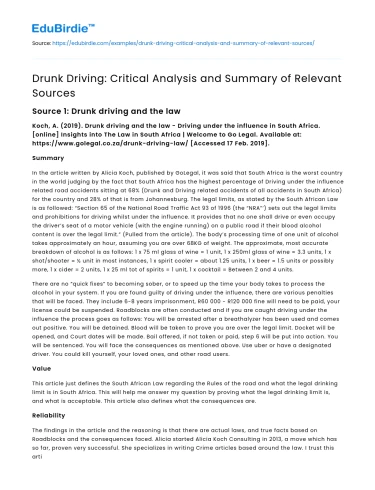Introduction
Drunk driving remains a persistent public health issue that poses significant risks to individuals and communities worldwide. It is a major contributor to traffic accidents, injuries, and fatalities, necessitating a comprehensive analysis of its causes, impacts, and potential solutions. According to the World Health Organization, approximately 1.3 million people die annually as a result of road traffic crashes, with a substantial proportion linked to alcohol impairment. Drunk driving not only endangers the life of the driver but also affects passengers, pedestrians, and other road users, making it a critical area of concern for policymakers and public health officials. This essay delves into the multifaceted nature of drunk driving, examining its causes, societal implications, and the effectiveness of various interventions designed to mitigate its occurrence. By critically analyzing relevant literature and real-world cases, this essay aims to provide a nuanced understanding of the issue and offer insights into potential strategies for reducing alcohol-related road incidents.
Understanding the Causes and Effects of Drunk Driving
The underlying causes of drunk driving are complex, often rooted in cultural, social, and psychological factors. Cultural attitudes towards alcohol consumption and driving can significantly influence the prevalence of drunk driving. In some societies, drinking is closely associated with socializing and entertainment, leading to a normalization of alcohol consumption even in situations where it may pose risks. Research by Smith (2019) highlights that in countries with lenient attitudes towards drinking and driving, the prevalence of such behavior is notably higher. Furthermore, psychological factors such as overconfidence in one's driving abilities after consuming alcohol play a critical role. This overestimation often leads to impaired judgment and increased risk-taking behaviors on the road, as noted by Jones and Anderson (2020).
Save your time!
We can take care of your essay
- Proper editing and formatting
- Free revision, title page, and bibliography
- Flexible prices and money-back guarantee
The effects of drunk driving are severe and far-reaching. Alcohol impairs cognitive functions and motor skills, leading to decreased reaction times, poor coordination, and impaired decision-making abilities. These effects significantly increase the likelihood of road accidents. A study by the National Highway Traffic Safety Administration (NHTSA) found that alcohol-impaired drivers are responsible for nearly one-third of all traffic-related deaths in the United States. Drunk driving also imposes substantial economic costs on society, including healthcare expenses, legal costs, and productivity losses. The societal burden is further compounded by the emotional and psychological trauma experienced by victims and their families, as demonstrated in the tragic case of the 2013 Santa Cruz accident, where a drunk driver caused multiple fatalities and injuries.
Interventions and Their Effectiveness
Efforts to combat drunk driving have led to the implementation of various interventions, ranging from legal measures to public awareness campaigns. Legal interventions, such as the establishment of blood alcohol concentration (BAC) limits and increased penalties for offenders, are commonly employed strategies. In countries like Sweden, strict enforcement of BAC limits has been associated with a significant reduction in alcohol-related accidents, as reported by Larsson and Peters (2018). Furthermore, sobriety checkpoints and random breath testing have proven effective in deterring potential offenders by increasing the perceived risk of being caught.
Public awareness campaigns aim to educate the populace about the dangers of drunk driving and promote responsible behavior. Campaigns such as the "Friends Don't Let Friends Drive Drunk" initiative have been instrumental in shifting public perceptions and encouraging community responsibility. However, despite these efforts, challenges remain. Critics argue that public awareness campaigns often lack the necessary reach and impact to effect substantial behavioral change, especially among high-risk groups. Additionally, counter-arguments suggest that while legal measures are essential, they must be complemented by broader societal changes, including improved public transportation and accessible alternative options for those who have consumed alcohol.
Conclusion
In conclusion, addressing the issue of drunk driving requires a multifaceted approach that considers both the underlying causes and the effectiveness of current interventions. While legal measures and public awareness campaigns have shown promise in reducing the incidence of drunk driving, they must be part of a broader strategy that includes cultural change and the provision of safe alternatives to driving under the influence. The analysis of relevant sources and real-world examples underscores the need for continued research and innovation in the development of effective policies and programs. By fostering a comprehensive understanding of the factors contributing to drunk driving and the most effective ways to combat it, society can work towards a future with safer roads and fewer alcohol-related tragedies.






 Stuck on your essay?
Stuck on your essay?

